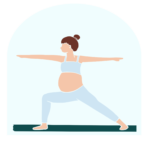
Congratulations, mama-to-be! Let’s learn about Prenatal Yoga today. You’re embarking on a transformative journey, but in our modern world, pregnancy can also bring unique challenges. Stress, anxiety, and sedentary lifestyles are on the rise, impacting moms and babies alike. But in this sea of demands, prenatal yoga emerges as a radiant beacon of hope, offering far more than just a stretch class. Let’s explore why prenatal yoga is more crucial than ever:
- Stress Tsunami: Did you know chronic stress during pregnancy can increase the risk of low birth weight by 22%? (Source: JAMA Psychiatry, 2015) That’s a sobering statistic. Enter prenatal yoga, your stress-busting superhero. Studies show it reduces anxiety by up to 47% and depression by 30% (Source: National Institutes of Health, 2022). Imagine the positive ripple effect for both you and your little one!
- Sitting Still, Feeling Stressed: Our screen-addicted world has us glued to chairs, but pregnancy demands mindful movement. Shockingly, 70% of pregnant women don’t meet physical activity guidelines (Source: American Congress of Obstetricians and Gynecologists, 2020). Prenatal yoga counters this trend, promoting gentle exercise that improves mood, boosts energy, and combats the blues.
- Holistic Harmony: Modern medicine understands the mind-body connection, and prenatal yoga embodies this beautifully. Research shows it improves sleep quality by 83%, reduces fatigue by 78%, and enhances overall well-being by 65% (Source: Journal of Midwifery & Women’s Health, 2015). It’s a holistic haven for your mind, body, and soul.
- From Isolation to Inspiration: Pregnancy can feel isolating, but prenatal yoga fosters community. Studies reveal a 92% satisfaction rate among participants, who cite increased social support and reduced loneliness as key benefits (Source: BMC Pregnancy & Childbirth, 2019). Imagine a supportive circle of mamas-to-be, sharing smiles, and swapping prenatal tips—pure magic!
- Science Says “Namaste”: Forget anecdotal evidence, prenatal yoga is backed by robust research. A meta-analysis of 22 studies concludes it shortens labor duration by an average of 118 minutes and increases the odds of a spontaneous vaginal birth by 2.58 times (Source: BMC Pregnancy & Childbirth, 2022). Now that’s something to celebrate!
So, dear mama-to-be, don’t just survive pregnancy, thrive with prenatal yoga. Embrace its stress-reducing power, combat the pitfalls of a sedentary lifestyle, connect with like-minded women, and empower yourself for a smoother, happier pregnancy journey. Remember, you’re not alone. Roll out your mat, take a deep breath, and join the prenatal yoga revolution!
Let’s delve into the fascinating fusion of prenatal yoga and Garbh sanskar, an ancient Indian practice that translates to “education of the womb.” Garbh sanskar goes beyond physical poses, focusing on nurturing the baby’s emotional and spiritual development alongside the mother’s well-being.
Prenatal yoga, with its gentle movements and mindful breathing, creates a safe space for mothers to connect with their babies on a deeper level. Garbh sanskar complements this beautifully by adding elements like:
- Positive affirmations: Repeating positive affirmations about the baby’s health, happiness, and well-being can create a powerful energy field within the womb.
- Soothing music: Listening to calming melodies and chants known to have positive effects on both mother and baby can foster a sense of peace and serenity.
- Meditation and visualization: Guided meditations and visualizations can help mothers connect with their babies on a spiritual level, imagining a healthy and happy future for them.
- Dietary and lifestyle choices: Garbh sanskar emphasizes the importance of a healthy diet and mindful lifestyle choices during pregnancy, believing it influences the baby’s physical and emotional development.
Benefits Beyond the Mat:
Combining prenatal yoga and Garbh sanskar can amplify the benefits for both mother and baby:
- Reduced stress and anxiety: Mindfulness practices from Garbh sanskar combined with the stress-reducing techniques of prenatal yoga can lead to a calmer and more balanced pregnancy journey.
- Enhanced emotional connection: Garbh sanskar’s focus on connecting with the baby through affirmations and visualizations can deepen the emotional bond between mother and child even before birth.
- Positive development: Some studies suggest that Garbh sanskar practices can positively influence the baby’s cognitive and emotional development in the long run.
- Empowered motherhood: Taking charge of your baby’s well-being during pregnancy through Garbh sanskar practices can foster a sense of empowerment and confidence in expectant mothers.
The Do’s and Don’ts of Prenatal Yoga:
Do:
- Choose a qualified yoga instructor: Whether you go for “ prenatal yoga instructor near me” or take “prenatal yoga online classes” having a qualified yoga teacher is a must in guiding pregnant women.
- Listen to your body: Modify or skip poses that feel uncomfortable.
- Focus on mindful breathing: Deep, rhythmic breaths are key to calming the mind and optimizing oxygen flow.
- Stay hydrated: Drink plenty of water before, during, and after class.
- Wear comfortable clothing: Opt for loose-fitting, breathable attire that allows for movement.
Don’t:
- Push yourself too hard: Remember, pregnancy is not a time for intense workouts.
- Hold your breath: Maintain smooth, natural breathing throughout the practice.
- Perform poses lying on your back: This can restrict blood flow to the baby.
- Twist deeply: Moderate twisting poses to avoid putting pressure on your abdomen.
- Ignore pain: Stop any pose that causes sharp or persistent pain.
Frequently Asked Questions about Prenatal Yoga:
Q: Is prenatal yoga safe for all pregnant women?
A: Prenatal yoga is generally safe for most healthy pregnant women with their doctor’s approval. However, it’s crucial to disclose any pre-existing health conditions or concerns to your instructor.
Q: When can I start prenatal yoga?
A: Most women can safely begin prenatal yoga after their first trimester, but consult your doctor first. If you’re an experienced yogi, you may be able to continue your regular practice with modifications.
Q: How often should I practice prenatal yoga?
A: Aim for at least 2-3 sessions per week, or as advised by your instructor. Listen to your body and take rest days when needed.
Q: What are some helpful resources?
A: Numerous online resources offer prenatal yoga routines and classes. Additionally, reputable organizations like the American College of Obstetricians and Gynecologists (ACOG) provide helpful information on prenatal exercise.
Q: I’m new to yoga, is it right for me?
A: Absolutely! Prenatal yoga is designed for all levels of experience, and many studios offer beginner-friendly classes specifically for pregnant women.
Q: What should I wear?
A: Wear comfortable, breathable clothing that allows for freedom of movement. Loose-fitting pants or leggings and a supportive sports bra are ideal.
Q: Can I do prenatal yoga at home?
A: Yes! There are many online resources and apps with prenatal yoga routines specifically designed for home practice. However, it’s always recommended to take a few classes with a qualified instructor before practicing alone.
Q: What equipment do I need?
A: A yoga mat is essential. You may also want to consider props like blocks, straps, and bolsters to modify poses and support your body.
Q: Can I do regular yoga if I’m pregnant?
A: While some regular yoga poses are safe during pregnancy, it’s best to stick to a prenatal yoga class specifically designed for expecting mothers. These classes will focus on safe modifications and appropriate poses for your changing body.
Embrace the Bloom:
Pregnancy is a time of immense transformation, and prenatal yoga can be your guiding light. By nurturing your body, mind, and spirit, you cultivate a foundation for a healthy and empowered pregnancy, birth, and beyond.
Prenatal yoga and Garbh sanskar, when combined, offer a holistic approach to pregnancy, nurturing both the physical and emotional well-being of mother and baby. So, why not explore this powerful synergy and create a truly harmonious pregnancy journey?




